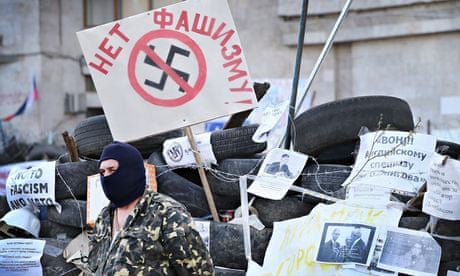The barricades that mark the entrance to the "Donetsk People's Republic" are plastered with anti-fascist posters, including an American flag with a swastika in place of the stars. The pro-Russian protestors who have set up their own government in the occupied administration building see the new Kiev regime as dominated by intolerant Ukrainian nationalists, which is why it was more than a little ironic when an antisemitic flyer appeared on Wednesday ordering Jews to register with these new authorities.
US secretary of state John Kerry soon waded into the media storm over the piece of paper, describing it as "grotesque" and "beyond unacceptable". But on Friday the chairman of the Donetsk People's Republic and the city's chief rabbi both stated that the flyer was a fake meant to discredit the so-called republic or the Jewish community.
The hoax has nonetheless contributed to the tense, divisive atmosphere in eastern Ukraine, where pro-Ukrainian and pro-Russian protests have ended in violence in recent weeks. A vicious information war has raged around the military operation Kiev is staging to try to take back buildings from pro-Russian demonstrators and militia, with Ukrainian media vilifying the protestors as "terrorists" and Russian media regularly calling the Kiev government a "fascist junta".
"I think it's someone trying to use the Jewish community in Donetsk as an instrument in this conflict. That's why we're upset," the chief rabbi, Pinchas Vishedski, told journalists on Friday.
According to Jewish community members at Donetsk's only synagogue, which was founded 110 years ago, three masked men walked up to worshippers standing on the street after a Passover service on Wednesday and tried to distribute the flyers. They wore no insignia and quickly left when asked to identify themselves.
The flyer asks all Jewish citizens aged 16 and older to register with the "Donetsk Republic commissar for nationality affairs" and pay a $50 fee, "given that the leaders of the Jewish community of Ukraine support the Banderite junta in Kiev and are hostile to the Orthodox Donetsk Republic and its citizens."
"Those who refuse to register will be deprived of citizenship and forcibly expelled from the republic and their property will be confiscated," it read.
The order was allegedly issued by "people's governor" Denis Pushilin, who denied the Donetsk People's Republic had anything to do with the flyer at a press conference on Friday.
Prominent Jews in Ukraine have previously come out in support of the Euromaidan protests in Kiev that ousted president Viktor Yanukovich, although official Jewish leaders have stopped short of endorsing the Euromaidan movement. One of the three main leaders of the movement, Oleh Tyahnybok, head of the nationalist party Svoboda, infamously once said that a "Moscow-Jewish mafia" was ruling Ukraine.
When seen by the Guardian on Friday, several aspects of the document immediately called into question its legitimacy. Pushilin is officially the chairman of the temporary government and has avoided being labelled its governor or leader. Also, the Donetsk People's Republic stamp shown there is poor quality and a different size than normally used, and the order is not signed.
Nonetheless, it initially provoked a strong reaction among the local Jewish community, which numbers about 15,000 people, according to Vishedski.
"We were alarmed but now things have calmed down," said worshipper Ari Schwartz.
"For people of the older generation, seeing this paper immediately brought up associations with what happened in Nazi Germany. It worried them," said an assistant rabbi, Ieguda Kelerman.
Although Jews sometimes encounter "everyday antisemitism" in Donetsk, he added, the government has never adopted any discriminatory policies towards them. He said Jews in Donetsk include both supporters and opponents of the new Kiev government.
Vishedski said he reported the incident to law enforcement authorities and asked them for additional protection of the synagogue and Jewish school, and he plans to raise the issue with the Russian Orthodox leader, Patriarch Filaret.
"The rise of nationalism in this country is of course not comfortable for us," Vishedski said.
But he declined to comment on the new Kiev government or the pro-Russian building takeovers in Donetsk and nearby regions.
"Some Jewish citizens participated in Maidan, they have a right to do this because they are citizens and this is a democracy," he said, but maintained the community is not involved in politics.
Alexander Sheremyet, a protestor occupying the administration building, said the hoax was likely to have been staged by someone associated with the Kiev government to discredit the Donetsk People's Republic.
"I don't think it's someone who wants to make money. It's probably part of the information war," he said.
